By MDS November 3 2020
The Covid 19 virus has shaken the world in all areas, especially the economy.
Deloitte Group has developed several possible scenarios to face this health tsunami that is becoming an economic and social hurricane.
What might life be like after the crisis passes, and what will it take to thrive in a world remade? Let’s explore four possible scenarios.
We are in uncharted waters, yet leaders must take decisive action to ensure their organizations are resilient. We’ve outlined four COVID-19 scenarios for society and business that illustrate different ways we could emerge from the crisis—and what’s required to thrive in a world remade.
Health care workers and researchers are on the front lines fighting COVID-19, hoping to slow the spread of the disease and care for the sick. Normal life has stopped for well over a billion people around the world.
While models and predictions abound, no one can say with certainty what the course of the virus will be, much less the impact the pandemic will have on people and societies. Eventually, though, the crisis will end, and life will return to “normal.” But what if it’s not like before? What will have changed as a result of what’s happening now?
The following COVID-19 scenarios for society and business explore the potential impact of the emerging global pandemic. Scenarios are stories about what the future may be like, created through a structured process to stretch thinking, challenge conventional wisdom, and drive better decisions today. They are no predictions about what will happen. They are only hypotheses about what could happen, designed to open our eyes to new opportunities or hidden risks.
We have chosen a three-to-five-year time frame, as it offers a window wide enough for significant change to take place but narrow enough for executives to take practical action now to build their organizational resilience.
Scenarios
Four distinct scenarios emerge based on current trends and critical uncertainties. They are summarized below, and more details can be found in the attached PDF:
The passing storm
The COVID-19 pandemic shakes society, but, after a slow start, is met with an increasingly effective health system and political response. The virus is controlled earlier than expected due to coordinated measures by global players to spread awareness and share best practices. Their competence in the crisis renews trust in public institutions.
The covid-19 pandemic has already causes long-term "economic waves of disease" around the globe. Fiscal and monetary stimulus help blunt the shocks but cannot reverse the losses that small businesses and lower- and middle-income individuals have begun to experience. Tensions sharpen between socioeconomic classes.
What we would need to believe ?
Governments effectively communicate the severity of the pandemic and collaborate to share best practices. Society complies with quarantine measures to effectively mitigate the coronavirus spread.
Mechanisms to combat the virus (such as immunization) are mobilized and lead to effective prevention and treatments in the long run.
Recovery is initially slow but speeds up in the second half of 2021 as consumers become more confident.
Good company
The COVID-19 pandemic persists past initial projections, placing a growing burden on governments around the world that struggle to handle the crisis alone. A surge of public-private sector partnerships emerges as companies step up as part of the global solution. New “pop-up ecosystems” arise as companies across industries partner to respond to critical needs and drive much-needed innovation. Social media companies, platform companies, and tech giants gain new prestige.
Ultimately, companies shift further toward “stakeholder capitalism,” with a more empathetic stance to how they can best serve their customers, shareholders, and employees to rebuild after the crisis.
What we would need to believe ?
Businesses take initiative to fight the COVID-19 virus’s spread by supplying health care expertise and enhanced software and tools.
A shift towards greater corporate responsibility is seen with new long-term outlooks leading to greater emphasis on investing in workers and communities.
Economic recovery begins late 2021. Recovery slow in early 2022 and speeds up by the second half of 2022.
Sunrise in the east
The COVID-19 pandemic is severe and unfolds inconsistently across the world. China and other East Asian countries manage the disease more effectively, whereas Western nations struggle with deep and lasting impacts—human, social, and economic—driven by slower and inconsistent responses.
The global center of power shifts decisively east as China and other East Asian nations take the reins as primary powers on the world stage and lead global coordination of the health system and other multilateral institutions. The ability of China, Taiwan, and South Korea to contain the outbreak through strong centralized government response becomes the “gold standard.”
What we would need to believe ?
East Asian countries emerge from the recovery period with less economic impact.
China significantly ramps up foreign direct investment efforts, bolstering its global reputation.
People accept greater surveillance mechanisms as part of the public good.
Economic recovery begins late 2021, with notably quicker and more robust recovery in the East.
Lone wolves
The COVID-19 pandemic becomes a prolonged crisis as waves of disease rock the globe for longer than anyone was prepared for. Mounting deaths, social unrest, and economic freefall become prominent. The invisible enemy is everywhere, and paranoia grows.
Nations put strict controls on foreigners and force supply chains home in the name of local security. Countries grow isolationist in the name of domestic safety. Government surveillance is commonplace, with tech monitors on people and their movements.
What we would need to believe ?



Comment here